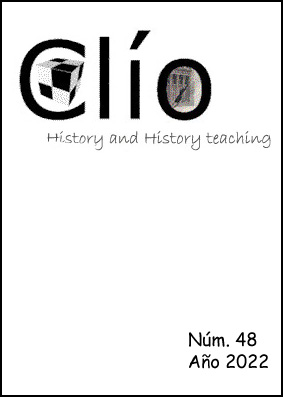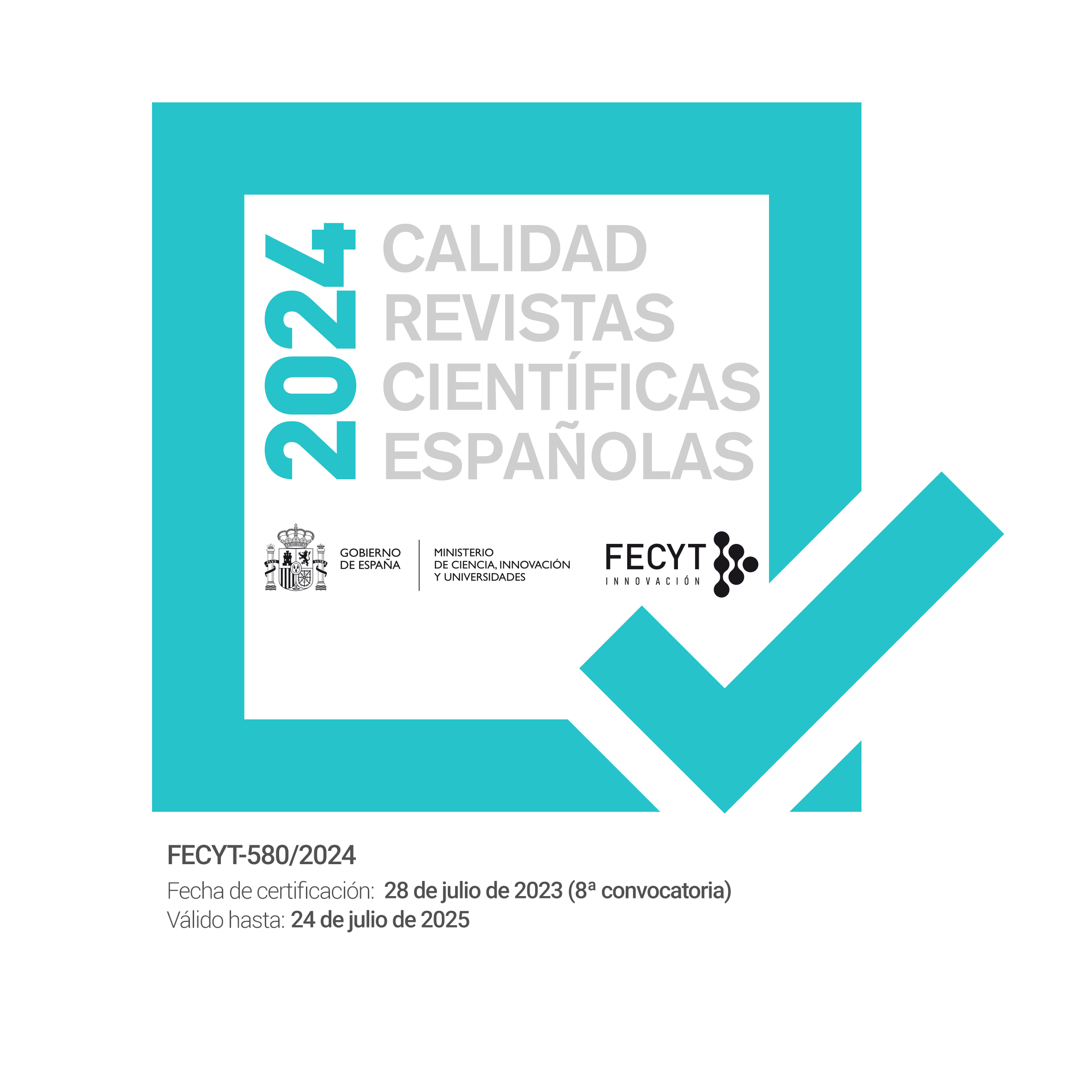Propuesta educativa para el trabajo conjunto del pensamiento histórico y la gamificación
DOI:
https://doi.org/10.26754/ojs_clio/clio.2022487294Palabras clave:
Pensamiento histórico, gamificación, propuesta educativa, educación histórica, innovación educativa.Resumen
La investigación en educación histórica señala la necesidad de una transformación del proceso de enseñanza-aprendizaje de la historia. Se aboga por un cambio que promueva el desarrollo del pensamiento histórico y atienda tanto a la metodología como la epistemología del área. El objetivo de este artículo es presentar un programa de intervención gamificado para el desarrollo del pensamiento histórico en Educación Primaria, cuyo diseño ha sido validado por juicio de expertos, con la finalidad de que pueda servir de referencia para el diseño de otras experiencias de aprendizaje gamificadas y contribuir así a la mejora de la educación histórica.
Descargas
Referencias
Álvaro-Tordesillas, A., Alonso-Rodríguez, M., Poza-Casado, I., y Galván-Desvaux, N. (2020). Gamification experience in the subject of Descriptive Geometry for Architecture. Educación XX1, 23(1), 373-408. https://doi.org/10.5944/educxx1.23591
Area, M. y González, C. S. (2015). De la enseñanza con libros de texto al aprendizaje en espacios online gamificados. Educatio Siglo XXI, 33(3), 15-38. http://dx.doi.org/10.6018/j/240791
Bai, S., Hew, K. F. y Huang, B. (2020). Does gamification improve student learning outcome? Evidence from a meta-analysis and synthesis of qualitative data in educational contexts. Educational Research Review, 30, 100322. https://doi.org/10.1016/j.edurev.2020.100322
CARM (Comunidad Autónoma de la Región de Murcia) (2014). Decreto 198/2014, de 5 de septiembre, por el que se establece el currículo de la Educación Primaria en la Comunidad Autónoma de la Región de Murcia. BORM (Boletín Oficial de la Región de Murcia), 206, 6 de septiembre de 2014.
Chapman, J. R. y Rich, P. J. (2018). Does educational gamification improve students’ motivation? If so, which game elements work best? Journal of Education for Business, 93(7), 315-322. https://doi.org/10.1080/08832323.2018.1490687
Corrales Serrano, M. (2021). La gamificación como herramienta para educar en la participación: Intervención didáctica en el aula de Historia. Clio. History and History Teaching, 47, 23–48. https://doi.org/10.26754/ojs_clio/clio.2021475859
Cózar-Gutiérrez, R. y Sáez-López, J.M. (2016). Game-based learning and gamification in initial teacher training in the social sciences: an experiment with MinecraftEdu. International Journal of Educational Technology in Higher Education, 13(2). https://doi.org/10.1186/s41239-016-0003-4
Csikszentmihalyi, M. (1990). Flow. The Psychology of Optimal Experience. Harper & Row.
Da Rocha-Seixas, L., Gomes, A. S. y De Melo-Filho, I. J. (2016). Effectiveness of gamification in the engagement of students. Computers in Human Behavior, 58, 48-63. https://doi.org/10.1016/j.chb.2015.11.021
Gómez, C. J., Ortuño, J. y Miralles, P. (2018). Enseñar ciencias sociales con métodos activos de aprendizaje. Reflexiones y propuestas a través de la indagación. Octaedro.
Gómez-Carrasco, C. J., Rodríguez-Pérez, R.A. y Mirete, A.B. (2018). Metodología didáctica y concepciones epistemológicas sobre la enseñanza de la historia. Una investigación con futuros maestros. Revista Complutense de Educación, 24 (1), 237-250. https://doi.org/10.5209/RCED.52233
Hamari, J., Koivisto, J. y Sarsa, H. (2014). Does Gamification Work?– A Literature Review of Empirical Studies on Gamification. En R. H. Sprague (Ed.), 47th Hawaii International Conference on System Science (HICSS) (pp. 3025-3034). IEEE Computer Society. https://doi.org/10.1109/HICSS.2014.377
Huang, R., Ritzhaupt, A.D., Sommer, M., Zhu, J., Stephen, A., Valle, N., Hampton, J., Li, J. (2020). The impact of gamification in educational settings on student learning outcomes: A meta-analysis. Education Tech Research Dev, 68, 1875–1901. https://doi.org/10.1007/s11423-020-09807-z
Hunicke, R., Leblanc, M., Zubek, R. (2004). MDA: A formal approach to game design and game research. En D. Fu, S. Henke y J. Orkin (Eds.), Proceedings of the AAAI-04 Workshop on Challenges in Game AI (pp. 1-5). AAAI Press.
Kapp, K. M. (2012). The Gamification of Learning and Instruction. Game-Based Methods and Strategies for Training and Education. John Wiley & Sons.
Landers, R. N. (2014). Developing a Theory of Gamified Learning: Linking Serious Games and Gamification of Learning. Simulation & Gaming, 45(6), 752–768. https://doi.org/10.1177/1046878114563660
Lee, P. (2005). Putting Principles into Practice: Understanding History. En M. S. Donovan y J. D. Bransford (Eds.), How students learn: History in the classroom (pp. 29-78). National Academies Press.
Lee, P. y Ashby, R. (2000). Progression in Historical Understanding among Students Ages 7-14. En P. N. Stearns, P. Seixas y Wineburg, S. (Eds.), Knowing, Teaching, and Learning History: National and International Perspectives (pp. 199-222). University Press.
Lévesque, S. y Clark, P. (2018). Historical Thinking: Definitions and Educational Applications. En S. A. Metzger y L. M. Harris (Eds.), The Wiley International Handbook of history teaching and learning (pp. 119-148). Wiley. https://doi.org/10.1002/9781119100812.ch5
Liceras, A. (2016). Las dificultades en la enseñanza y el aprendizaje de las ciencias sociales. En A. Liceras y G. Romero (Coords.), Didáctica de las Ciencias Sociales. Fundamentos, contextos y propuestas (pp. 95-118). Pirámide.
Llopis, M. A. y Balaguer, P. (2016). El uso del juego en educación. Gamificación. En O. Chiva y M. Martí (Coords.), Métodos pedagógicos activos y globalizadores ( pp. 85-101). Graó.
Manzano-León, A.; Camacho-Lazarraga, P.; Guerrero, M.A.; Guerrero-Puerta, L.; Aguilar-Parra, J.M.; Trigueros, R.; Alias, A. (2021). Between Level Up and Game Over: A Systematic Literature Review of Gamification in Education. Sustainability, 13, 2247. https://doi.org/10.3390/su13042247
Metzger, S.A. y Harris, L. M. (Eds.) (2018). The Wiley International Handbook of history teaching and learning. Wiley
Monteagudo-Fernández, J., Rodríguez Pérez, R. A., Escribano-Miralles, A. y Rodríguez García, A. M. (2020). Percepciones de los estudiantes de Educación Secundaria sobre la enseñanza de la historia, a través del uso de las TIC y recursos digitales. Revista Electrónica Interuniversitaria de Formación del Profesorado, 23(2). https://doi.org/10.6018/reifop.417611
Ortiz-Colón, A. M., Jordán, J. y Agredal, M. (2018). Gamificación en educación: una panorámica sobre el estado de la cuestión. Educação e Pesquisa, 44, 1-17. http://dx.doi.org/10.1590/S1678-4634201844173773
Prats, J. y Santacana, J. (2011). Enseñar a pensar históricamente: la clase como simulación de la investigación histórica. En J. Prats (Coord.), Didáctica de la Geografía y la Historia (pp. 67-89). Barcelona: Graó.
Prieto, J. M. (2020). Una revisión sistemática sobre gamificación, motivación y aprendizaje en universitarios. Teoría de la Educación. Revista Interuniversitaria, 32(1), 73-99. http://dx.doi.org/10.14201/teri.20625
Rivero, P. (2017). Proceso de gamificación en el aula de ciencias sociales. Íber. Didáctica de las Ciencias Sociales, Geografía e Historia, 86, 4-6.
Sailer, M. y Homner, L. (2020). The Gamification of Learning: a Meta-analysis. Educational Psychology Review, 32, 77–112. https://doi.org/10.1007/s10648-019-09498-w
Sánchez-Segovia, Á. y Colomer-Rubio, J. C. (2018). Gamificación y construcción del pensamiento histórico: desarrollo de competencias en actividades gamificadas. Clío: History and History Teaching, 44, 82-93.
Seixas, P. y Morton, T. (2013). The Big Six Historical Thinking Concepts. Nelson Education Ltd.
Swacha, J. (2021). State of Research on Gamification in Education: A Bibliometric Survey. Educ. Sci., 11(2), 69. https://doi.org/10.3390/educsci11020069
Thorp, R. y Persson, A. (2020). On historical thinking and the history educational challenge. Educational Philosophy and Theory, 52(8), 891-901, https://doi.org/10.1080/00131857.2020.1712550
VanSledright, B. A. (2014). Assessing historical thinking and understanding. Innovate designs for new standards. Routledge.
Werbach, K. y Hunter D. (2012). For the Win: How Game Thinking Can Revolutionize Your Business. Wharton Digital Press.
Descargas
Publicado
Número
Sección
Licencia
Derechos de autor 2022 María Martínez-Hita

Esta obra está bajo una licencia internacional Creative Commons Atribución-NoComercial-CompartirIgual 4.0.
Este trabajo tiene una licencia internacional Creative Commons Attribution-NonCommercial-ShareAlike 4.0 International License.
Los derechos de autor siguen siendo propiedad de los autores. Se debe obtener permiso de los autores para la reimpresión y el contenido de JoS no se puede copiar con fines comerciales. JoS, sin embargo, se reserva el derecho de reproducción futura de artículos en copia impresa, formato de documento portátil (.pdf) o ediciones HTML de JoS.






